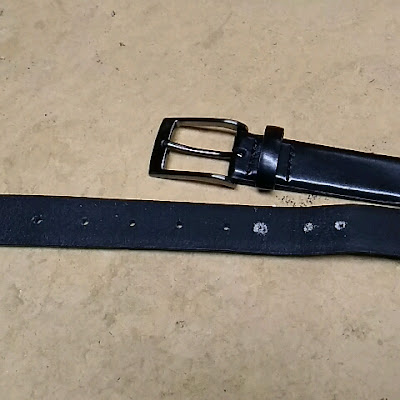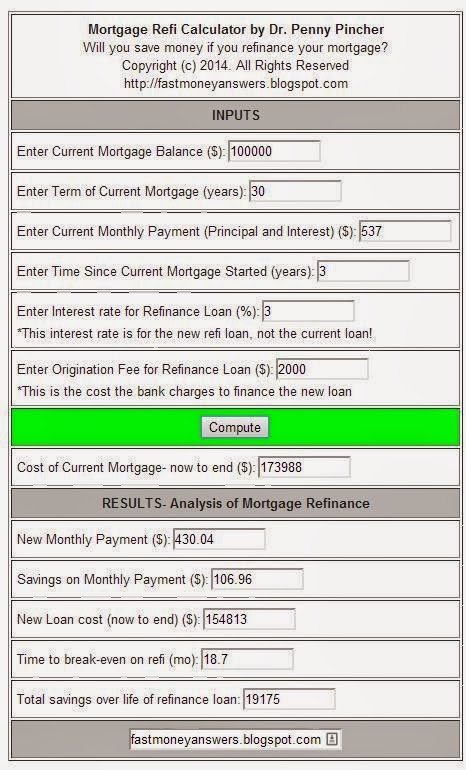 |
| Tightening The Belt |
This morning, I ran into a problem-- the kind of problem it's nice to have. I put on my belt and found that it didn't work... I tightened it up all the way and buckled it, but it wasn't doing anything. It was time to tighten the belt.
I stepped out into my woodshop and removed my belt. My cordless drill was standing ready for just such a situation. I popped a drill bit in and laid the belt on a scrap of 2x4. I picked just the right spot for a new hole so I could tighten the belt, and after a slight hesitation, I pulled the trigger.
 |
| Here's How I Made My Belt Smaller With A Drill |
An interesting thing about tightening the belt: you might think I have lost weight and this resulted in the need to tighten my belt. But I weighed myself first thing this morning before I even put on the belt and my weight has not changed lately. So why didn't my belt fit anymore?
Measuring weight and measuring your waist size are not measures of the same thing. I have been riding my bike (both my free 1972 Schwinn Super Sport and my EVO CX indoor exercise bike). I have been crawling around my attic working on some projects. Last weekend, I dug up a tree and moved it around to the front of my house. This weekend, I dug into the side of a hill to install some terraced landscape timbers. With nice spring weather coming in, my dogs have been insisting on longer and faster walks every day.
The reason I needed to tighten my belt isn't that I lost weight, it is that I lost some fat and gained some muscle. I still have the same amount of weight, it has just moved around a little bit. So my belt size is telling me more about my fitness right now than the weight reading on my scale.
This made me think about ways that people measure money and the progress they are making. People tend to pick a number and focus on improving that number. For example, if you are attacking debt you will focus on your debt balance. If you are trying to build an emergency fund, you will focus on your savings account balance. If you are trying to hit an investment goal to reach retirement, you will focus on your investment account balance. If you are trying to reduce expenses, you might focus on your spending totals. The reason I was focused on weighing myself is that my doctor "helped" me set a goal for my weight.
The problem with picking one number to monitor and improve is that it may be a precise measure of something that doesn't tell the whole story. That is why my smaller belt size confused me at first. I was thinking that my weight on the scale was the metric that mattered. Tightening the belt reminded me that there are lots of measures of my health and fitness that matter as well, even things that go beyond numbers at all.
The most revealing personal finance number to focus on is your net worth, which is a measure of your total assets minus your total liabilities. But even a comprehensive number like this may not tell you everything you need to know about your financial health. Focusing on a number may be keeping you from thinking about how you are really doing.
Are you stressed out, or is your life satisfying? Are you growing and on a path to reach your goals, or are you just trying to survive until something changes? No matter what scale you are using to measure progress in your financial life, financial success only really matters if you are successful in life, whatever that means. "Success in life" is hard to measure, so people tend to measure and track financial success instead.
So when my doctor asks me to set a goal at my next physical exam, instead of throwing out an ambitious number for a weight goal or blood pressure reading, I'll tell him I want to take my dogs for walks so long and so fast that they can barely keep up. I want to ride my bike to reach remote places that few people will ever see. I want to do whatever landscaping projects that my wife dreams up without even thinking about hiring younger guys to do the hard work instead of doing it myself. To me, these goals matter more than tracking numbers.
Tracking your net worth and other key metrics can provide useful insights into your financial well-being. But are you focusing too much energy on numbers that are easy to measure instead of appreciating the things that really matter to you?
Copyright © 2017 by Dr. Penny Pincher. All Rights Reserved. Privacy Policy

















